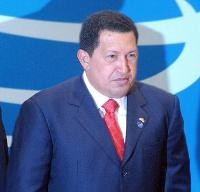Half a century ago, Latin America experienced golpes, or military coups, on a regular basis. In a pattern that varied little across the continent, citizens would simply wake up one morning to the sound of gunfire near the presidential palace. Before long, a military man would head a new regime. Always, he had acted "for the good of the country." Through varying degrees of repression, he would quickly push aside the opposition, install his cronies in positions of influence and personal enrichment, shut down opposition media, and take control of all the country's levers of power. Today that style of revolution sounds so musty and antiquated, so 20th century!
It's not surprising that a Latin American military man invented the new, much more elegant version of the authoritarian takeover. Venezuela's President Hugo Chávez has acted gradually to achieve many of the same goals of his golpista forefathers. His latest move, if successful, will now deal a deathblow to all accepted standards of freedom of speech in that country.
On July 30, Venezuelan Attorney General Luisa Ortega Diaz presented the legislature in Caracas with an astonishing document that should -- and did -- send chills down the spine of anyone who values freedom of expression. The bill, aimed at punishing what the government calls "crimes of opinion," was denounced by human rights and civil liberties organizations across the hemisphere. The non-partisan Freedom House described it as "an affront to the universal right to freedom of expression" and a direct violation of the Universal Declaration of Human Rights, as well as Venezuela's own constitution. Human Rights Watch called it "the most comprehensive assault on free speech in Venezuela since Chávez came to power." The Committee to Protect Journalists said the bill "is reminiscent of the dark days of Latin American dictatorships," and called it "part of a pattern of repression by President Chávez to silence independent and critical voices."

